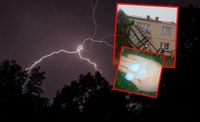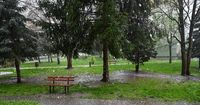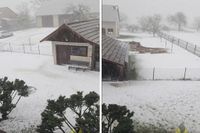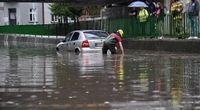On April 18, 2025, the Lublin region of Poland faced a devastating hailstorm in Tarnogród and a fierce storm that disrupted rail transport in nearby Puławy. The hailstorm struck around 17:00, lasting only a few minutes but causing catastrophic damage to local agriculture. Farmers reported losses of up to 100% of their crops, particularly affecting rapeseed, currants, raspberries, and young fruit trees. The mayor of Tarnogród, Paweł Dec, described the aftermath as a "tragedy for local agriculture," emphasizing the severe financial impact on many farms.
This calamity is not an isolated incident; similar weather events have plagued the region in recent years. In May 2024, a hailstorm wreaked havoc on orchards around Opole Lubelskie, resulting in estimated losses of approximately 35 million złoty. The frequency and intensity of such storms have raised concerns among local authorities and farmers about the growing threat posed by climate change.
In addition to the agricultural losses, the storm in Puławy caused significant damage to urban infrastructure. The storm severed railway traction between Dęblin and Lublin, leading to a complete suspension of train services. Mayor Paweł Maj reported that numerous trees were uprooted, roofs were damaged, and power outages affected several neighborhoods. The Puławy Miasto station, which typically handles around 64 long-distance and regional trains daily, temporarily halted operations due to failures in lighting and signage systems.
Emergency services were stretched thin, responding to nearly 370 reports related to the severe weather across the Lublin Voivodeship. Most of these interventions involved removing fallen trees and securing damaged roofs. In Puławy alone, firefighters recorded about 200 interventions primarily linked to strong winds. Fortunately, the efficient warning system from the Institute of Meteorology and Water Management (IMGW) ensured that there were no reported fatalities or serious injuries among residents.
The aftermath of the storm has prompted local governments to take immediate action. Authorities in Tarnogród and Puławy are collaborating with the Lublin Voivodeship and crisis services to expedite the release of emergency funds. Farmers affected by the hailstorm can apply for financial compensation through the Agency for Restructuring and Modernization of Agriculture (ARiMR), provided they submit damage reports prepared by provincial commissions.
Looking ahead, the IMGW has issued second-degree warnings for further storms in the Lublin Voivodeship, forecasting rainfall of up to 40 mm and wind gusts reaching 100 km/h. These predictions have raised alarm bells, as extreme weather events have increased by about 30% since 2020, underscoring the urgent need for adaptive measures to mitigate future risks.
Experts are advocating for the implementation of protective measures such as hail nets, which could reduce damage by as much as 70%, significantly enhancing the safety of agricultural crops. Additionally, modernizing urban drainage systems is crucial to prevent flooding during heavy rainfall. The ARiMR is also being urged to optimize damage assessment procedures to facilitate quicker compensation payouts, ideally within 30 days of reporting.
As the Lublin region grapples with the aftermath of these extreme weather events, local authorities are calling for solidarity and support for affected farmers. Mayor Paweł Dec has emphasized the importance of community resilience and the need for coordinated efforts to address the challenges posed by climate change.
The events of April 18, 2025, serve as a stark reminder of the increasing unpredictability of weather patterns and the pressing need for both immediate and long-term strategies to protect the region's agricultural and urban landscapes. The responsibility for effective crisis management lies with both local governments and state agencies, whose collaboration is essential for navigating future threats.
In conclusion, the recent hailstorm and storm in the Lublin region have highlighted the vulnerabilities faced by both the agricultural sector and urban infrastructure in the face of climate change. As communities begin to recover, it is crucial that they work together to implement preventive measures and build resilience against the increasingly frequent and severe weather events.









